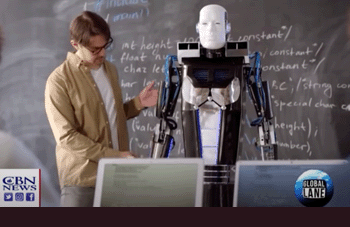04-24-2025 Steve Warren and Gary Lane
Microchips implanted in our brains and artificial intelligence that’s much smarter than humans. It sounds like a science fiction novel, but could such technological advances be imminent?
That question seems to keep repeating itself. It’s reminiscent of the final scene in the 2004 movie The Aviator when Howard Hughes (portrayed by Leonardo DiCaprio) looks into a mirror and keeps saying, “The way of the future,” over and over again. The Movie Blog explained in 2020, “The final scene makes it clear that Hughes has a long and difficult life ahead of him.”
But what about humanity and the advancement of technology? Do we have a long and difficult battle ahead? One author says it appears to be an unavoidable part of our timeline.
Appearing on an episode of The Global Lane, the author of the book Dark Aeon exposes part of the globalist agenda for the future.
“Transhumanism is the great merger of humankind with the Machine. At this stage in history, it consists of billions using smartphones. Going forward, we’ll be hardwiring our brains to artificial intelligence systems,” author Joe Allen writes.
READ Would You Like a Microchip in Your Brain? Vast Majority Worry About Totalitarian Control as Tech Advances
With an academic background in both science and theology, Allen confronts the paradox of what he calls “good people constructing a digital abomination.”
Allen explains “scientism” as the techno-elite’s belief that science and technology, not God, are the means to human salvation.
“Scientism is the belief that scientific inquiry and discovery will answer all of the existential questions in human life,” Allen told CBN News’s Gary Lane. “All of those questions which religion seeks to satisfy, scientism holds up material discovery as the means of salvation. The means of transcendence.”
“Transhumanism is an outgrowth of that,” he explained. “Transhumanism is the idea that technology will be the instrument of that salvation. The instrument of that transcendence.”
“So this is not uncommon knowledge, I think in our era,” Allen said. “It’s in fact very obvious, especially in the wake of the pandemic.
Lane asked Allen if it was by accident that one of the best-known robots of our time was named Sophia. A fictional character named Sophia was fabricated by Gnostics as a feminine figure that had god-like features as the supposed female twin of Jesus Christ, according to their unbiblical beliefs.
“So the robot Sophia addressed the U.N. yet again for their sustainable development goals meeting. Sophia takes her name directly from the Gnostic aeon Sophia,” Allen said.
“The robot was created by Hanson Robotics. David Hanson, the founder of Hanson Robotics, named Sophia after the character Sophia in Philip K. Dick’s novel Valis. The novel Valis has a Gnostic premise. The character Sophia is meant to symbolize the Sophia of Gnosticism,” he explained.
“And if you look at the statements from David Hanson. If you look at David Hanson’s PhD dissertation and of course, other figures in and around Hanson Robotics, there’s no denying they are seeking to create a sort of technological inversion of what the ancient Gnostics put forward.”
Lane also asked about Elon Musk’s 2023 suggestion that microchips would one day be implanted in billions of people’s brains. He asked Allen what this would mean for humanity. Would it make us smarter? Destroy us? Both?
“He foresees a potential future in which he said hundreds of millions or billions of people would be implanted with these in order to guide A.I. according to human will,” Allen said.
The author went on to explain that two other companies already have brain-computer interfaces implanted in human brains that allow them to interact with digital devices by way of artificial intelligence.
“This is already a reality,” Allen told CBN News.
